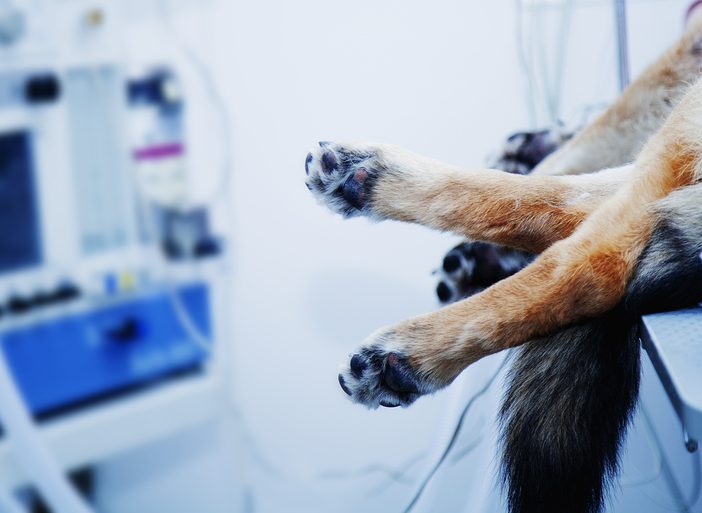
I recently went into the emergency clinic where I do relief work to help with a surgery. When I got there, it was — well a typical weekend afternoon at the emergency clinic. The cages were full of sick patients, the rooms were full of worried clients. The doctor who was scheduled to be on was doing a thoracocentesis — while Dad watched on. Oh yeah, did I mention this was an open hospital where clients come right into the treatment area and are present for as much of their pet’s treatment as they want to be? That part is less typical.
And so, in the nature of this particular hospital, a client had chosen to stay with her hospitalized dog — for the entire weekend. Hunter had gotten into a bottle of ibuprofen and was clinically fine, but needed decontamination and IV fluids. The client and pet had been set up in the back of the prep room (away from the scrub sink) with an IV pole, and a cot.
And so, as I scrubbed in for my exploratory laparotomy, I chatted with the client. She told me about how she got him and how attached he was to her husband. She told me about how she wouldn’t leave him alone in the hospital.
“You’ve got a really good Mom, Hunter,” I told him.
“No, he doesn’t, he has a terrible Mom. It’s all my fault that this happened. I left the ibuprofen out.”
I tried to reassure her in the approximately 60 seconds of scrubbing I had left. “You can’t blame yourself. These things happen to everyone.” I told her about the time I forgot to check the bouquet of flowers I’d received for lilies and my cat wound up in the same position.
We’re only human. We do our best every day, but we can only do so much. There is always going to be a time when we turn our back on that bottle of Advil or miss the lilies right in front of our faces. And sometimes we’ll do everything right and things will still go wrong.
Checkers, that patient with the foreign body, didn’t make it. I knew it was bad the moment I’d cut through the peritoneum. The intestine was tightly bunched and extremely angry looking. There wasn’t a rupture yet, but sharp, chewed up bits of plastic were pressing dangerously into the bowel wall in multiple locations. Three hours, a gastrotomy, two enterotomies, and a resection and anastomosis later, the foreign material was all gone, the abdomen was flushed and closed, the patient was in recovery with a plan for continued treatment, and my colleague and I had done all we could do but cross our fingers and wait and see.
Here’s a little lesson I learned recently. We can control our actions, but we can’t control outcomes. All we can do is the best we can do. After that, we need to let it go and learn to be at peace with whatever may happen.
It’s easier said than done. Hunter’s Mom is going to be a lot more careful with medication from now on, but she may never truly forgive herself for his winding up in the hospital in the first place. And a part of me will always carry Checkers with me — wondering if I could have changed her outcome.
But I am not a God and neither are you (or maybe you are, in which case, it’s pretty awesome that you’re taking the time out to read my insignificant words of wisdom.) The universe is infinitely more powerful than any one individual. What kind of hubris leads us to believe we can control it?
So what’s the point of even trying? Why go to work every day if nothing we do matters? Except that it does matter. We may not be able to control outcomes, but we can influence them. And if that small nudge from me can push the universe in the right direction, then I have to keep trying.
The views and opinions expressed in this article are those of the author and do not necessarily reflect the position of the DrAndyRoark.com editorial team.